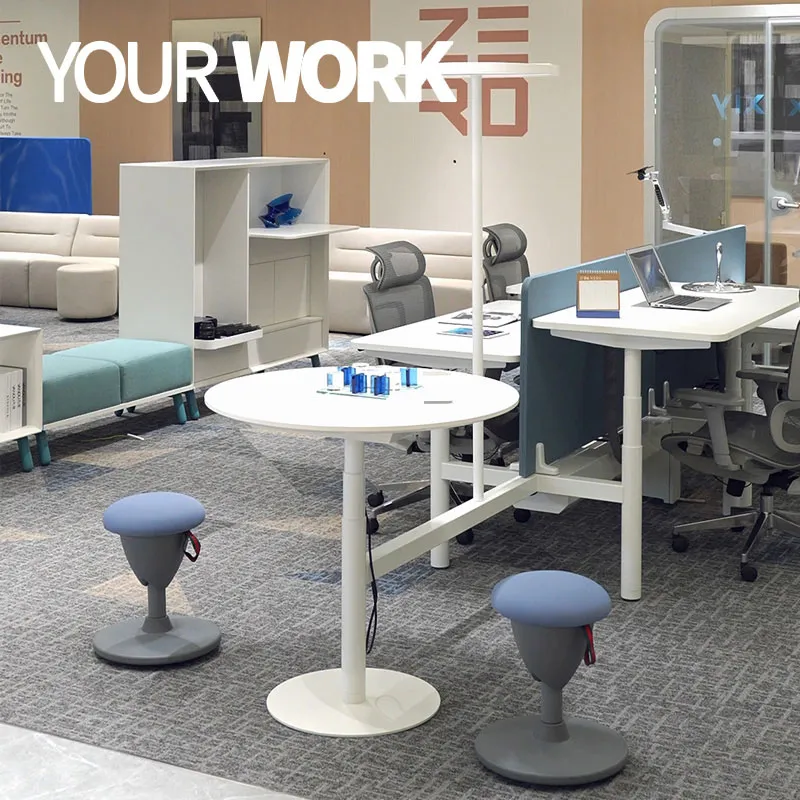What Makes an Office Desk the Key to Productivity?
2024-11-12
In today’s fast-paced world, where most people spend a significant portion of their day at a desk, the choice of office furniture is more important than ever. Among all the elements in your workspace, the office desk plays a crucial role in not just your comfort, but also your productivity, organization, and overall well-being. But what exactly makes an office desk so vital to your success?
1. Why is the Right Office Desk Essential for Productivity?
The office desk is often the centerpiece of your workspace. It’s where your ideas come to life, where work gets done, and where you spend hours every day. Choosing the right desk goes beyond aesthetics—it directly impacts your ability to work effectively.
- Comfort and Ergonomics: A desk that is comfortable and ergonomically designed can make a huge difference in how productive you are throughout the day. If your desk is too high or low, or if it doesn’t offer enough space for your body to move comfortably, it can lead to discomfort or even strain, which can slow you down. An adjustable desk, one that offers space for your legs and allows you to sit at the proper height, can help maintain proper posture, reduce fatigue, and prevent long-term health problems like back pain.
- Space for Work: An office desk with ample surface area provides room for your computer, papers, notebooks, and other essentials. If your desk is cluttered or too small, you may find it hard to focus or organize your thoughts. A spacious desk allows for efficient multitasking and helps keep everything in place, making it easier to stay on top of your work.
- Organization: An organized desk can significantly improve your workflow. Desks with built-in storage like drawers, shelves, or organizers help you declutter your workspace, making it easier to access items you need without unnecessary distractions. The simpler your desk setup, the more focused you can stay, which is key to getting work done efficiently.
2. What Features Should You Look for in an Office Desk?
When shopping for an office desk, there are several features to consider, depending on your needs, style, and workspace. Here are some key factors to keep in mind:
- Size and Shape: Office desks come in various shapes, from traditional rectangular designs to more modern L-shaped or corner desks. The shape of your desk should complement the space available in your office while also offering enough room for your equipment. If you work with multiple monitors or need space for files, a larger desk might be necessary. For smaller spaces, a compact desk or a corner desk can help maximize your available area.
- Material: The material of your desk affects both its durability and aesthetic. Wood desks often offer a warm, classic look, while metal or glass desks can provide a more modern, sleek appearance. Consider how the material fits into your office design and how it will hold up over time. For example, wood desks are sturdy and timeless but may require more maintenance, while metal desks are more durable and easy to clean.
- Storage: A desk with storage solutions such as drawers, filing cabinets, or shelving can help you keep your work essentials organized and within reach. Look for a desk with built-in storage if you need to store documents, stationery, or office tools. This not only keeps your workspace tidy but also helps prevent clutter from building up on the desk surface.
- Adjustability: Standing desks or adjustable-height desks are becoming increasingly popular in modern offices. These desks allow you to switch between sitting and standing positions throughout the day, which can promote better posture, reduce stress on your body, and improve energy levels. Adjustable desks are ideal for people who want to stay active and reduce the risk of health problems related to prolonged sitting.
- Cable Management: In the age of technology, office desks with cable management features are a must. A desk with built-in cable trays or holes can help you organize cables from your computer, phone, and other devices. This simple addition can prevent a tangle of wires from cluttering your workspace, making it easier to focus on your tasks.
3. How Does the Office Desk Impact Your Mental Health?
A clean and organized office desk doesn’t just improve productivity—it can also have a positive impact on your mental health. A well-organized workspace reduces stress and creates a sense of calm, helping you to feel more in control of your tasks. Conversely, a cluttered or uncomfortable desk can contribute to feelings of anxiety or frustration, as it can feel overwhelming and make it difficult to focus.
Moreover, having a comfortable desk that supports good posture can contribute to better physical health, which in turn positively impacts your mental state. When you feel physically at ease, you are more likely to feel focused, clear-headed, and energized throughout the day.
4. How Does an Office Desk Reflect Your Work Style?
Your office desk can be a reflection of your personality, work style, and preferences. Whether you prefer a minimalist setup with a sleek, clean surface or a more personalized and creative desk space filled with inspirational quotes and plants, your desk can play a role in shaping the environment in which you work.
- Aesthetic Appeal: An aesthetically pleasing workspace can have a direct impact on your mood and motivation. Choosing a desk that suits your style and incorporating elements that make the space enjoyable to work in can help keep you engaged and motivated to do your best work. Personalizing your desk with decor, like plants, artwork, or inspirational items, can enhance your mood and creativity.
- Work Style: Your desk setup should also cater to your working habits. If you tend to work on multiple tasks at once, you might prefer a larger desk with more surface area. If you need privacy or a quiet space for deep work, a desk with partitions or a private office setup may be more suited to your needs.
5. Can the Right Desk Improve Your Overall Work-Life Balance?
An office desk that is tailored to your needs can help improve not just your productivity but also your work-life balance. By having a functional and comfortable desk, you can create an environment where you feel empowered to focus on your tasks while also taking breaks when needed. If your desk encourages you to take regular standing or stretching breaks, it can contribute to better physical health and well-being, which in turn helps maintain a healthy work-life balance.
Moreover, an organized desk allows you to have clear boundaries between work and personal life, particularly if you work from home. A designated workspace helps you mentally separate work from relaxation, making it easier to disconnect when the workday is over.
6. Conclusion
An office desk is more than just a place to sit and work—it is a crucial tool for your productivity, health, and overall work experience. By selecting a desk that meets your needs, supports your physical well-being, and fits your workspace, you can create an environment that fosters efficiency, comfort, and focus. So, next time you’re setting up your office, remember that the right desk could be the key to unlocking your full potential.



